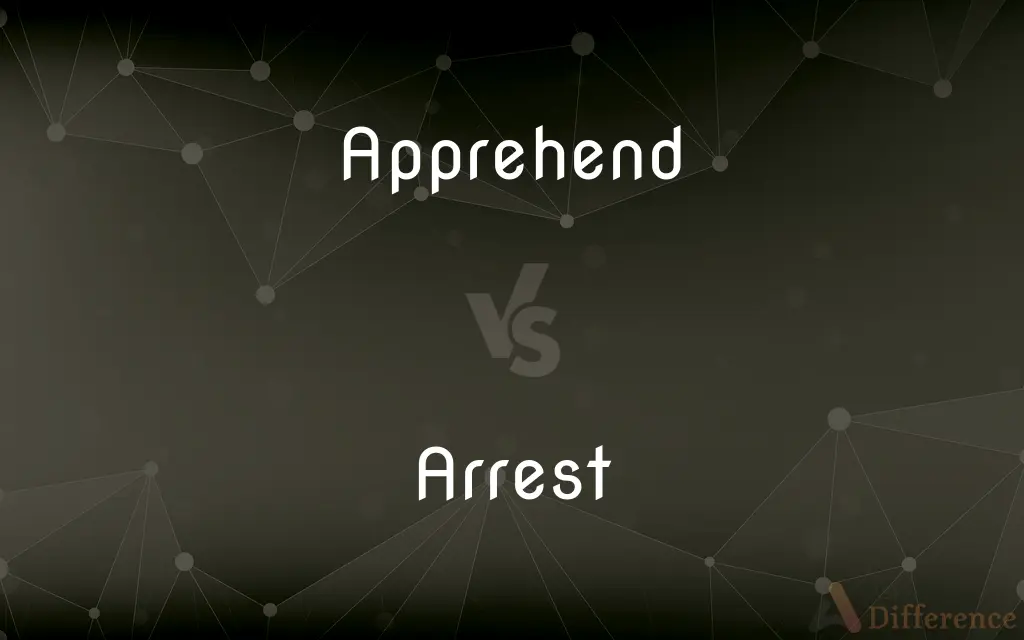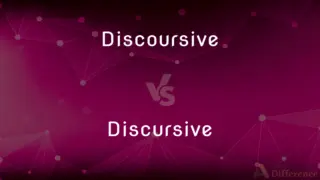Apprehend vs. Arrest — What's the Difference?
By Maham Liaqat & Fiza Rafique — Updated on March 8, 2024
Apprehend involves understanding or capturing, while arrest specifically refers to legal detainment by authorities.

Difference Between Apprehend and Arrest
Table of Contents
ADVERTISEMENT
Key Differences
Apprehending someone can mean either grasping a concept mentally or capturing someone suspected of wrongdoing. It's a broader term that encompasses the act of understanding or coming to terms with something, as well as the physical act of detention. On the other hand, arresting someone is a specific legal action undertaken by law enforcement or authorized personnel, involving taking a person into custody, usually because they are suspected of committing a crime.
While apprehension can occur in various contexts, from educational to law enforcement, arrest is strictly a legal procedure that follows specific protocols and legal standards. An arrest typically requires a warrant or probable cause that a crime has been committed, whereas apprehension could simply be the act of stopping someone without the formal process of arrest.
The consequences of apprehension and arrest differ significantly; apprehending someone might lead to a conversation or a minor intervention, whereas arresting someone has legal ramifications, potentially leading to charges, a court appearance, and possibly detention. Arrests are recorded and can have long-lasting effects on an individual's legal record and personal life.
In law enforcement, the term apprehend is often used to describe the broader process of identifying, locating, and taking a suspect into custody, which may or may not culminate in an official arrest. The arrest is the formal act that may follow apprehension, involving reading of rights, and the initiation of legal processes.
The terminology used in legal contexts is precise; while "apprehend" might be used in everyday language to describe the act of stopping or detaining someone, "arrest" has a specific legal definition and implications. This distinction is crucial in legal proceedings and law enforcement operations, underscoring the importance of procedural correctness and the rights of individuals.
ADVERTISEMENT
Comparison Chart
Definition
To understand or capture
To detain legally by authority
Context
Broader, including mental grasp or physical capture
Legal, involving law enforcement
Legal Implications
Varies, can be non-legal
Strong legal implications, procedural
Consequences
Can be educational or minor intervention
Legal process, potential charges, and court appearance
Usage in Law Enforcement
Broad process of capturing or stopping
Specific act of taking into legal custody
Compare with Definitions
Apprehend
To understand or grasp a concept.
She was quick to apprehend the nuances of the new language.
Arrest
To seize by legal authority and take into custody.
The police arrested the suspect without incident.
Apprehend
To feel anxious or fearful about something that might happen.
He apprehended the worst when he saw the storm clouds gathering.
Arrest
To stop or halt, often used metaphorically.
The sudden illness arrested her progress on the project.
Apprehend
To capture or seize, especially in a law enforcement context.
The officers moved swiftly to apprehend the fleeing suspect.
Arrest
The act of detaining someone suspected of criminal activity.
The arrest was made on charges of burglary.
Apprehend
To anticipate, especially with fear or anxiety.
Apprehending the difficult journey ahead, they made meticulous preparations.
Arrest
To attract and hold the attention.
The painting arrested the attention of every visitor in the gallery.
Apprehend
To arrest someone, used less formally.
The detective apprehended the culprit hiding in the alley.
Arrest
A device for stopping motion, such as in a clock or other mechanism.
The engineer designed a new arrest mechanism for the safety system.
Apprehend
To take into custody; arrest
Apprehended the murderer.
Arrest
An arrest is the act of apprehending and taking a person into custody (legal protection or control), usually because the person has been suspected of or observed committing a crime. After being taken into custody, the person can be questioned further and/or charged.
Apprehend
To grasp mentally; understand
"Science is the systematic method by which we apprehend what is true about the real world in which we live" (Richard Dawkins).
Arrest
To stop; check
A brake that automatically arrests motion.
Arrested the growth of the tumor.
Apprehend
To become conscious of, as through the emotions or senses; perceive
"She began to look with her own eyes.
To see and to apprehend the deeper undercurrents of life" (Kate Chopin).
Arrest
To seize and hold under the authority of law.
Apprehend
(Archaic) To anticipate with worry or dread.
Arrest
To capture and hold briefly (the attention, for example); engage.
Apprehend
To understand something.
Arrest
To undergo cardiac arrest
The patient arrested en route to the hospital.
Apprehend
(transitive)
Arrest
The act of detaining in legal custody
The arrest of a criminal suspect.
Apprehend
To be or become aware of (something); to perceive.
Arrest
The state of being so detained
A suspect under arrest.
Apprehend
To acknowledge the existence of (something); to recognize.
Arrest
A device for stopping motion, especially of a moving part.
Apprehend
To take hold of (something) with understanding; to conceive (something) in the mind; to become cognizant of; to understand.
Arrest
The act of stopping or the condition of being stopped.
Apprehend
To have a conception of (something); to consider, to regard.
Arrest
A check, stop, an act or instance of arresting something.
Apprehend
To anticipate (something, usually unpleasant); especially, to anticipate (something) with anxiety, dread, or fear; to dread, to fear.
Arrest
The condition of being stopped, standstill.
Apprehend
To seize or take (something); to take hold of.
Arrest
(legal) The process of arresting a criminal, suspect etc.
Apprehend
(law enforcement) To seize or take (a person) by legal process; to arrest.
Officers apprehended the suspect two streets away from the bank.
Arrest
A confinement, detention, as after an arrest.
Apprehend
(obsolete)
Arrest
A device to physically arrest motion.
Apprehend
(intransitive)
Arrest
(nautical) The judicial detention of a ship to secure a financial claim against its operators.
Apprehend
To be of opinion, believe, or think; to suppose.
Arrest
(obsolete) Any seizure by power, physical or otherwise.
Apprehend
To understand.
Arrest
(farriery) A scurfiness of the back part of the hind leg of a horse
Apprehend
To be apprehensive; to fear.
Arrest
To stop the motion of (a person, animal, or body part).
Apprehend
To take or seize; to take hold of.
We have two hands to apprehend it.
Arrest
To stay, remain.
Apprehend
Hence: To take or seize (a person) by legal process; to arrest; as, to apprehend a criminal.
Arrest
(transitive) To stop or slow (a process, course etc.).
Apprehend
To take hold of with the understanding, that is, to conceive in the mind; to become cognizant of; to understand; to recognize; to consider.
This suspicion of Earl Reimund, though at first but a buzz, soon got a sting in the king's head, and he violently apprehended it.
The eternal laws, such as the heroic age apprehended them.
Arrest
(transitive) To seize (someone) with the authority of the law; to take into legal custody.
The police have arrested a suspect in the murder inquiry.
Apprehend
To know or learn with certainty.
G. You are too much distrustful of my truth.E. Then you must give me leave to apprehendThe means and manner how.
Arrest
(transitive) To catch the attention of.
Apprehend
To anticipate; esp., to anticipate with anxiety, dread, or fear; to fear.
The opposition had more reason than the king to apprehend violence.
Arrest
To undergo cardiac arrest.
Apprehend
To think, believe, or be of opinion; to understand; to suppose.
Arrest
To take, seize, or apprehend by authority of law; as, to arrest one for debt, or for a crime.
Apprehend
To be apprehensive; to fear.
It is worse to apprehend than to suffer.
Arrest
To seize on and fix; to hold; to catch; as, to arrest the eyes or attention.
Apprehend
Get the meaning of something;
Do you comprehend the meaning of this letter?
Arrest
To rest or fasten; to fix; to concentrate.
We may arrest our thoughts upon the divine mercies.
Apprehend
Take into custody;
The police nabbed the suspected criminals
Arrest
To tarry; to rest.
Apprehend
Anticipate with dread or anxiety
Arrest
The act of stopping, or restraining from further motion, etc.; stoppage; hindrance; restraint; as, an arrest of development.
As the arrest of the air showeth.
Arrest
The taking or apprehending of a person by authority of law; legal restraint; custody. Also, a decree, mandate, or warrant.
William . . . ordered him to be put under arrest.
[Our brother Norway] sends out arrestsOn Fortinbras; which he, in brief, obeys.
Arrest
Any seizure by power, physical or moral.
The sad stories of fire from heaven, the burning of his sheep, etc., . . . were sad arrests to his troubled spirit.
Arrest
A scurfiness of the back part of the hind leg of a horse; - also named rat-tails.
Arrest
The act of apprehending (especially apprehending a criminal);
The policeman on the beat got credit for the collar
Arrest
The state of inactivity following an interruption;
The negotiations were in arrest
Held them in check
During the halt he got some lunch
The momentary stay enabled him to escape the blow
He spent the entire stop in his seat
Arrest
Take into custody;
The police nabbed the suspected criminals
Arrest
Hold back, as of a danger or an enemy; check the expansion or influence of;
Arrest the downward trend
Check the growth of communism in Sout East Asia
Contain the rebel movement
Turn back the tide of communism
Arrest
Attract and fix;
His look caught her
She caught his eye
Catch the attention of the waiter
Arrest
Cause to stop;
Halt the engines
Arrest the progress
Halt the presses
Common Curiosities
How does apprehension differ from understanding?
In the context of understanding, apprehension refers to the mental grasp of concepts or situations, whereas in law enforcement, it refers to the physical capture or detention of individuals.
Can anyone apprehend a suspect?
While specific laws vary by jurisdiction, citizens may have the power to apprehend or detain someone in certain circumstances, but formal arrests are typically conducted by authorized law enforcement personnel.
What legal rights does an arrested individual have?
An arrested individual has several legal rights, including the right to remain silent, the right to an attorney, and the right to be informed of the charges against them.
What does it mean to apprehend someone?
To apprehend someone can mean to capture or detain them, particularly in a law enforcement context, but it can also mean to understand or grasp a concept.
Can apprehension lead to arrest?
In law enforcement, apprehension can lead to arrest if the individual is suspected of committing a crime and there is sufficient evidence or legal grounds for an arrest.
Is an arrest the same as detention?
An arrest involves taking someone into legal custody with the intention of charging them with a crime, while detention can be a temporary and less formal holding of an individual.
What happens after someone is arrested?
After an arrest, the individual is usually taken to a police station, booked, and may be held for a court appearance or released on bail.
What is a citizen's arrest?
A citizen's arrest is an arrest made by a private citizen rather than a sworn law enforcement official, typically allowed under specific conditions when a crime is witnessed.
Are there consequences for wrongful apprehension or arrest?
Wrongful apprehension or arrest can lead to legal consequences for the individuals or authorities involved, including civil liabilities or disciplinary actions.
How do police decide to apprehend or arrest someone?
Police decisions to apprehend or arrest someone are based on evidence, probable cause, legal warrants, and the specifics of the situation, following legal protocols and procedures.
Share Your Discovery

Previous Comparison
Discoursive vs. Discursive
Next Comparison
Homework vs. HouseworkAuthor Spotlight
Written by
Maham LiaqatCo-written by
Fiza RafiqueFiza Rafique is a skilled content writer at AskDifference.com, where she meticulously refines and enhances written pieces. Drawing from her vast editorial expertise, Fiza ensures clarity, accuracy, and precision in every article. Passionate about language, she continually seeks to elevate the quality of content for readers worldwide.















































